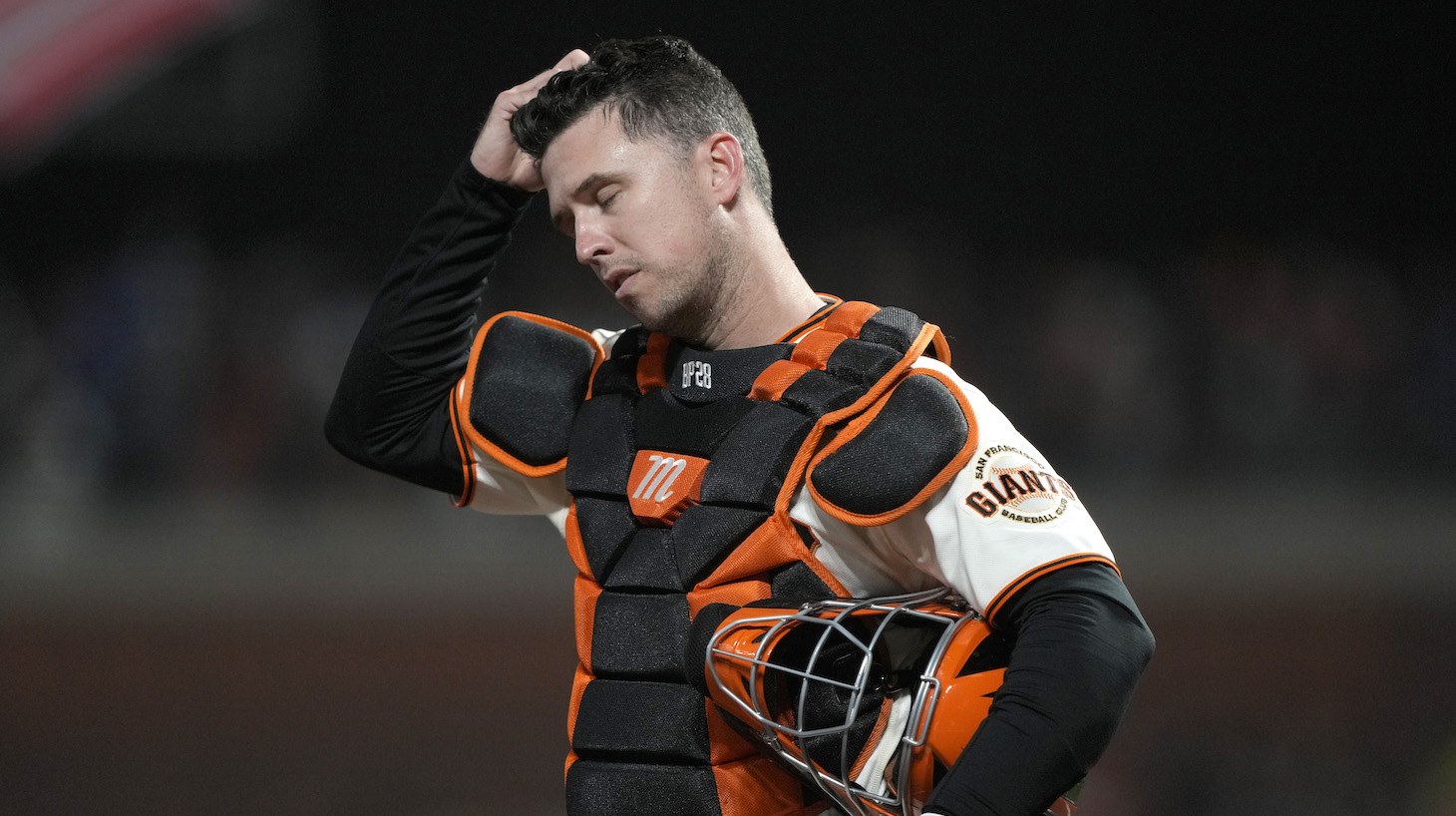In the most important way of all, the best thing Buster Posey ever did was retire. He'll tell you if you ask him.
In filing his paperwork, Posey is out in the most Posey way imaginable: on his own timetable, in his own idiom, on his own terms, in the ascendant. In case you're wondering what other players have managed to do that, the answer is almost nobody. He could have stayed a San Francisco Giant, he could have banked another $40 million or so as a de facto pitching coach and clubhouse Yoda. Instead, he went out as he went in, totally in character that barring serious evidence means that he was at least forthright in word as well as deed. The rarest of all baseball skills is, after all, sincerity. This is who he was, and who he is.
Posey's baseball career is an outlier in that he was on a clear fade, took a gap year in 2020 to heal up his balky brake-lining-deficient hips, and came back with a .300 flourish. And no, your knee-jerk suspicions about PEDs based on baseball card-level data require far more corroboration than your ability to call up his baseball-reference.com page. But enough guessing at character, a talent at which sports media is particularly impaired. Posey showed what he wanted to show and no more, so it is better to take him at face value and let the tinfoil hat brigades seek out the JFK Jr. stories that need only time to fabricate nothing out of nothing.
Still, at some point—starting, well, now, as a matter of fact—his career must be assessed, which makes this inevitably a Jay Jaffe column. Jaffe (senior writer at FanGraphs) has devoted more time to the Hall of Fame and its mechanisms than any other human, even inventing stats to measure candidates, and as such has established himself as the reigning expert on the Hall and what it takes to force entry. He is, in short, a fellow of great scholarship and a completely baffling companion, as his wife Emma Span (managing editor at The Athletic) will surely corroborate. If you want the actual numbers-and-context- based argument for or against Posey's enshrinement, wait for Jaffe to wake up, the slugabed.
But here is where Posey's resume transcends his mega-cool "toodle-oo, suckers" mode of retiring. His Baseball Reference page suggests a lower-than-average candidate for a plaque and a custodian, yet the emotion of the day, especially from utterly untrustworthy Giants and last-thing-I-remember fans, is that he is a total first-ballot guy because he is damned Buster. San Francisco Chronicle columnist Ann Killion put the sentiment in different terms:
One of the great legacies of the catcher's career is the number of dogs named either Buster or Posey in the Bay Area.
— Ann Killion (@annkillion) November 3, 2021
Remember, JAWS can refer to dogs as well as Hall of Fame credentials.
But where in his field is Posey exactly? First, here's who he is not:
- Johnny Bench
- Gary Carter
- Ivan Rodriguez
- Carlton Fisk
- Mike Piazza
- Yogi Berra
- Bill Dickey
- Gabby Hartnett
And if you accept even one-third of the anecdotal evidence atop the sketchy statistical data, Josh Gibson is right in there.
The only other Hall of Fame catchers are 2020 inductee Ted Simmons, Buck Ewing (great mustache), Roy Campanella (a considerable piece of the 1950s Brooklyn dynastette), Roger Bresnahan (invented the catcher's mask), Ray Schalk (an honest player on the 1919 Black Sox), Rick Ferrell (often listed as the worst Hall of Famer ever) and Biz Mackey (played 21 years in the Negro Leagues, then World War II intervened, then played three more years before retiring at age 49). The only other foreseeably conceivable Hall of Famer backstops are Posey contemporaries Joe Mauer and Yadier Molina, unless you have a preternatural fondness for Russell Martin or Salvador Perez.
Posey sits in the sub-Gibson group, one which includes Thurman Munson, Bill Freehan, and Jorge Posada. Some of his comps are in the Hall, others aren't. But precedent is a dirty liar here, and emotion is the enemy of logic. Posey's mode of departure is now part of the legend with the three rings and the Gary Cooper stoicism, but some people who listed him in mid-hysteria as the second-greatest San Francisco Giant after Willie Mays forgot a few superiors along the way, like McCovey, and Marichal, and Bonds.
So the Hall of Fame is a strong maybe, and Posey's place in franchise history is, too. But he did go out better than any other Giant ever, and almost any player ever. He played for his family when he played, and he walked for his family when he walked. For the next five years, that is sufficient. More than sufficient, really. Buster Posey won, even if he never reaches Cooperstown, or gets his number retired, or a statue stuck on the bayside promenade. Fame is a fleeting thing—just ask Biz Mackey—but leaving the business because you think it's time to leave can never be countermanded or underestimated. In other words, he already got everything he ever wanted, so anything after this is just lotto money.






